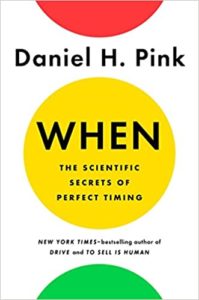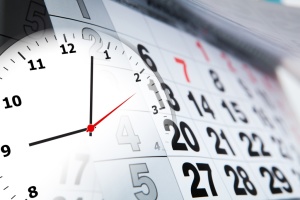
I think it’s appropriate to start my thoughts on When with a proverb on planting trees: “The best time to plant a tree was 20 years ago. The second-best time is now.”
Not only because When is all about how to choose the best times to do things, but because this half-written article has been sitting around waiting for me to have some extra when in my schedule to finish it.
Yes, it would have been better to finish it up when I first read the book. But the second-best time is today.
And in When, Dan takes his magnifying lens and explores what we know about how timing affects our success personally and professionally.
Big Thought
Dan is always good for reviewers because he will tell you directly what the book is about. There’s no guessing or analysis up.
So in his words, When is his exploration of three concepts:
“I used to believe that timing was everything. Now I believe that everything is timing.”
“It’s not so much about how as about when”
“We often think about the power of what, but not the power of when.”
Ideas, Implications, and Questions

There are a few key takeaways you can pull from When. They weren’t very surprising, but I found that they helped me understand some unexamined patterns in life. Which makes sense because he’s looking at experiences that we all have, every day.
- One area that he looked at was the circadian rhythms that guide our day. You’ve probably noticed that you are more focused and effective and certain times of the day. That’s normal, and there are two main patterns. Most people (he calls them larks) peak by mid-morning and then have a dip in mid-afternoon before a burst of energy around 5:00. The other main group, the night owls peak later in the evening.
- The big take-away here: figure out what pattern you follow and then do whatever you can to schedule your high-priority activities when you are the freshest and most alert.
- This book is worth reading even if all you learn is the scientific support for taking naps. That’s right, naps. There is a lot of evidence that taking one or more naps during the day can actually make you more effective, as opposed to powering right through the day. Dan points out that you should set your alarm, if you use one, for 27 minutes when you take a nap. It takes about 5-7 minutes to fall asleep on average. And 20 minutes is the best amount of time for the nap.
- In looking at naps he also looks at the power of breaks. There is a lot of evidence that giving your mind and your body a rest during your day creates a ton of benefits. He points out a few ways to make your breaks better: get up, get outside, get away from your screens. Even just 5 minutes every hour can have a huge impact.
- On a larger scale, Dan also covers the power of temporal landmarks. I’d used the concept intuitively, but I didn’t have a name for it. When looking for ways to make change stick, it’s good to tie the beginning to a temporal landmark, which is any day that stands out from the rest. This could be a birthday, New Year’s Day, or even a Monday or the first of the month. It’s a way of focusing your attention and restarting your momentum.
- In a little side note, he mentions that it’s usually better to be losing a little at half-time. Because then you are motivated and inspired to work harder in the second half. I’ve found that true over the decades of coaching salespeople. But the trick is to not be losing by a lot, just enough to goad you on to put in the work you knew you should have been putting in during the first half.
Should you read this book? Who should read this book?
Dan has a solid track-record of putting out professional development books that are relevant to a large swath of the public, and When keeps that streak going. Since all of us are subject to time, it makes sense that everyone can pull something from it.
I think it’s especially useful if you work for your yourself or in a remote-work setting. The more control you have over your schedule, the more important it is to be intentional about how you manage your activities during the day. This is a great guide for making the most of your freedom. And knowing when you should and shouldn’t schedule your meetings!
